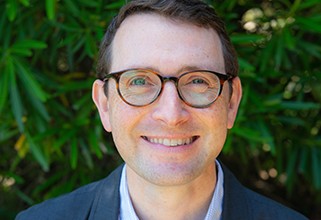Clergy Column by Rabbi Heath Watenmaker

Confirming Our Judaism
May/June 2023
What does it mean to confirm our Judaism? In what ways do we affirm our connection to our Jewish community and our faith, and claim ownership of our Jewish identity?
For as long as I’ve been at Beth Am, I’ve had the incredible honor of working with our Confirmation students each year to craft a unique and meaningful Confirmation ceremony that explores their answers to these questions. This is the culmination of a year of study, conversation and exploration of what it means to be Jewish in the 21st century.
Over the course of their tenth grade year, our Confirmands explore this question from different perspectives with our clergy and educators. They consider where and how their Jewish identity fits into their broader identities. They further develop their language for thinking about and describing their theology. They dig into the complexities and nuances of Israel. They learn about the history and ideological underpinnings of Reform Judaism. They explore the intersection between Judaism and social justice, which includes a weekend in Washington, DC to participate in the Reform Movement’s Religious Action Center L’Taken Seminar, where they dive deep into this theme. Their time in Washington culminates in a day spent on Capitol Hill, lobbying their representatives and senators on issues they care about, doing so from a personal and Jewish perspective. Finally, the year concludes with the preparations for a Confirmation ceremony that reflects their growth, their learning and their unique talents and interests as individuals and as a class.
The Confirmation ceremony is a newer and uniquely Reform ritual, and dates back a little over 200 years ago to the early years of Reform Judaism. Scholars date some of the earliest Confirmation ceremonies to the turn of the 19th century, around 1803, in the Reform synagogues of Germany. Though the initial iterations did not include girls, confirmands would answer questions that displayed a comprehension of Jewish religious principles, and often included some sort of public statement or affirmation of their Jewish faith. In 1846, Rabbi Isaac Mayer Wise, the leading American Reform rabbi of the 19th century, introduced Confirmation to the United States while serving a congregation in Albany, New York. By the end of the 19th century, Confirmation had emerged as a common practice among Reform Jews of both North America and Europe.1
At Beth Am, Confirmation has been an important cornerstone of our educational programming since our founding. The first Beth Am Confirmation Class, in 1956 (the second year of our existence) had seven members. In the Beth Am Foyer, you can find the annual Confirmation class photographs dating all the way back to 1959. You can see how hairstyles varied over the years and how classes varied over the years. But at their core, they all centered around the same statement: each class took ownership of their Jewish experience and identity, confirming and re-affirming their Judaism.
What might it mean for us, wherever we are in our lives, to confirm our Judaism? What elements of our Jewish experience do we confirm or re-affirm on a regular basis? How often do we consider the Jewish choices we make in our own lives and the ways in which Jewish values shape our sense of ethical and moral behavior in our world today? The Reform Movement has long centered the idea of making informed Jewish choices - taking on or rejecting different aspects of belief and practice based on our own personal learning and connection to these practices. In 1999, the Central Conference of American Rabbis issued a “Statement of Principles for Reform Judaism,” which:
…affirms the central tenets of Judaism — God, Torah and Israel — even as it acknowledges the diversity of Reform Jewish beliefs and practices. It also invites all Reform Jews to engage in a dialogue with the sources of our tradition, responding out of our knowledge, our experience and our faith. Thus we hope to transform our lives through kedushah, holiness.2
The affirmations and central tenets of Reform Judaism expressed in this statement have largely shaped the Reform movement over the last two decades. In considering our connection to and ownership of our Judaism, we can also continue to find ways to bring holiness and meaning into our daily lives.
On Saturday, May 13 at 7:00 PM, we will celebrate our newest class of Confirmands, the class of 5783/2023, with a ceremony that will reflect all of their diversity, uniqueness and talents. It will reflect the myriad ways our teens connect with and express their Jewish identity. In so many ways, these ceremonies from year to year are in themselves a confirmation of the promise of the Jewish future. As we often say to our Confirmands, if they are the future leaders of our Jewish world, we’re in good hands.
Rabbi Heath Watenmaker
rabbi_watenmaker@betham.org
________________
1 Much of this history is gleaned from articles found at myjewishlearning.com/article/history-of-confirmation and reformjudaism.org/beliefs-practices/lifecycle-rituals/what-confirmation.
2 For the full statement, see ccarnet.org/rabbinic-voice/platforms/article-statement-principles-reform-judaism.

 We strive to live as a holy community whose study and practice of Judaism inspires and challenges us to "do justice, to love kindness and to walk humbly with our God" (Micah 6:8).
We strive to live as a holy community whose study and practice of Judaism inspires and challenges us to "do justice, to love kindness and to walk humbly with our God" (Micah 6:8).